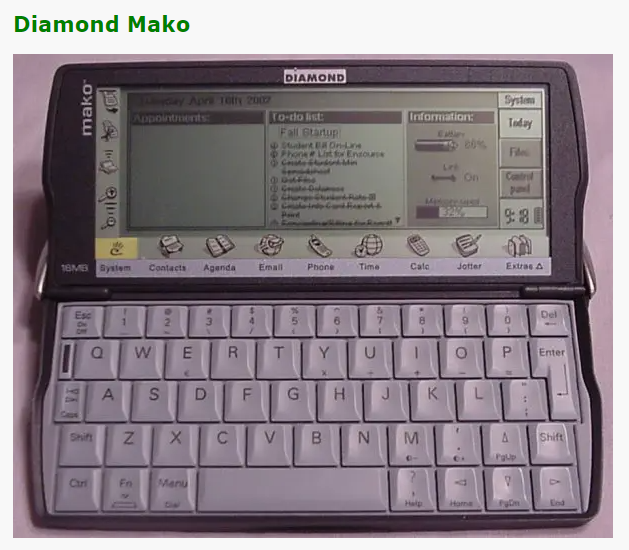
[ad_1]
I like PCs. I spend most of my days writing about them. (Or no less than, one thing associated to them). But I additionally like mild, transportable units and these twin pursuits led me to buy a Diamond Mako as soon as upon a time.
Back within the period of the private digital assistant (PDA), you solely had two actual selections for cellular computing: a giant pocket book or a fair greater laptop computer. If you wanted a tool that doubled as a blunt trauma weapon (or means to enhance your stamina whereas tromping to and from courses), you had been residing in the correct period.
Meanwhile, PDAs served as rudimentary proto-smartphones, and so they weren’t low-cost. They didn’t do a lot both—not in comparison with at the moment’s iPhones and Android units. But that Mako. It had a big display (bear in mind, this was the early 2000s), a compact keyboard (maybe the smallest 65 % board in existence), and a contact display. More importantly, you could possibly really edit paperwork and spreadsheets on it, along with extra fundamental PDA features. I liked that factor and used it till I lastly saved sufficient for an extremely light-weight laptop computer (a Dell Latitude X200, in case you’re curious).
Are you out there for a light-weight laptop computer? If so, it is best to try our roundup of the best 2-in-1 laptops available right now.

The Diamond Mako, as seen on the Obsolete Computer Museum web site. Look at that keyboard! That contact display! The solely actual downside was the shortage of backlighting on the show. Oh, and the battery. Gosh, I miss it.
PCWorld
Since then, I haven’t actually appeared again. I really bought the Mako, too, pondering that it deserved to stay out the rest of its life in service fairly than moldering in my desk drawer.
But the development of folding smartphones has stirred up that dormant a part of my mind, and I don’t suppose it’s going to calm down till I lastly get some prolonged time with one. Whether that’s one in all Samsung’s Galaxy Fold models or the rumored Google Pixel Fold, I’m questioning how properly I might use one as a PC substitute.
This a part of my mind is energetic regardless of my very own expertise. I do know higher than most individuals {that a} cellphone is just not a PC. More particularly, I do know that you may’t rework a cellphone into an alternative to a desktop PC—software program like Bixby isn’t fairly the identical. I’ve additionally spent hours attempting to find out if I might simply power cellular units into performing like a full pc: Perhaps I might discover a option to root a pill and put Windows for Arm processors onto it? Maybe I’d neglected a contemporary cellphone or pill operating an x86 processor? Could it’s doable to make use of Linux or ChromeOS? (The reply to all these questions: No).
But I really like the thought of with the ability to pull out a single gadget from a jacket pocket, flipping it open to a bigger display, pulling an extremely compact keyboard from my bag, and comfortably diving into writing an article on the fly, in addition to tweaking the accompanying photos. Then after I’m carried out, folding it again up and utilizing it like an everyday cellphone—a juiced up, fashionable tackle the expertise I had on my Mako. I can sort of try this now on my present smartphone, however the display is small and my eyes aren’t what they was.
Will the fact be seamless and straightforward? Probably not. But I’m jazzed to strive. Maybe chalk it as much as nostalgia, however the thought of tempering expectations due to gadget limitations doesn’t hassle me. When I held that fancy PDA in my palms twenty years in the past, I solely noticed chance. I see that once more now.
When I lastly get to run this experiment, I’ll let you know the way it goes.
[adinserter block=”4″]
[ad_2]
Source link